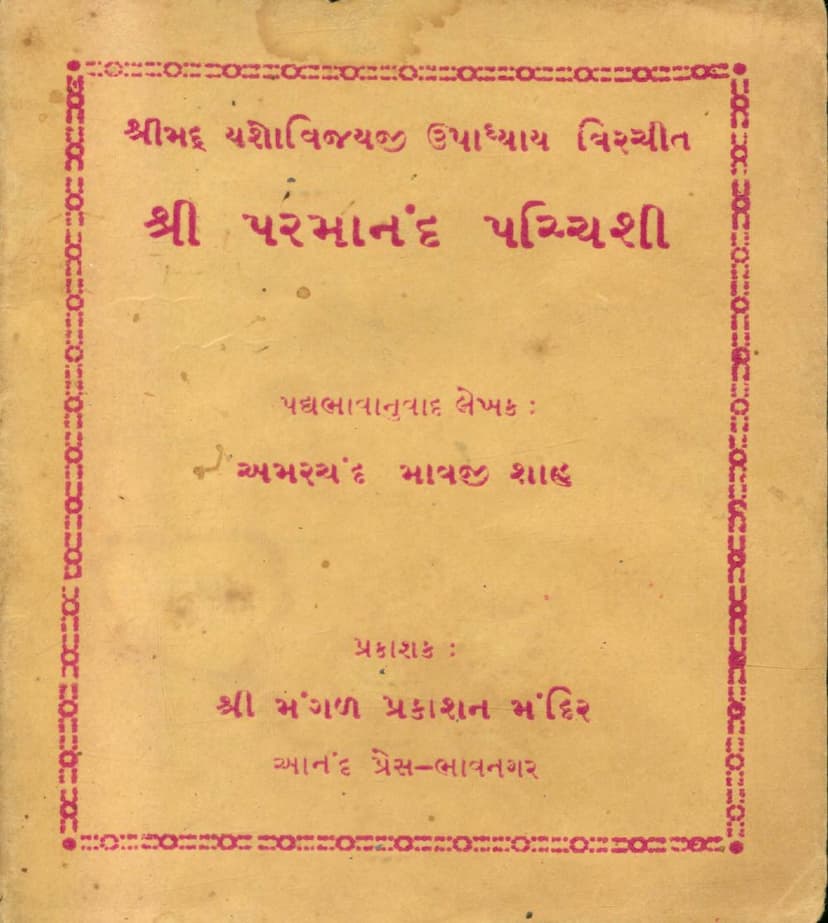Parmanand Pacchisi
Added to library: September 2, 2025

Summary
Here is a comprehensive summary of the Jain text "Parmanand Pacchisi" by Amarchand Mavji Shah, based on the provided pages:
Title: Parmanand Pacchisi (The Twenty-Five Verses of Supreme Bliss) Author: Amarchand Mavji Shah (translated from Sanskrit) Original Author: Yogishwar Shrimad Yashovijayji Upadhyay Publisher: Mangal Prakashan Mandir, Bhavnagar
Overall Purpose and Content:
"Parmanand Pacchisi" is a profound Jain text that aims to guide individuals towards realizing the true, blissful nature of the soul (Atman). The book presents twenty-five verses originally composed in Sanskrit by the esteemed philosopher and yogi, Yashovijayji Upadhyay. Amarchand Mavji Shah has created a Gujarati translation and commentary (Bhavanuvad) that makes the philosophical concepts accessible to a wider audience. The work is considered a "Gita of Jainism" due to its spiritual depth and focus on self-realization.
Key Themes and Teachings:
The verses and their interpretations emphasize the following core Jain principles:
- The True Nature of the Soul: The soul is described as inherently blissful, pure, omniscient, possessing infinite energy and consciousness. It is free from attachment, aversion, desires, and physical ailments. It is distinct from the body and its limitations.
- Identification of Ignorance: The text highlights that ignorance (ajnana) prevents individuals from recognizing their true soul. Just as a blind person cannot see the sun, those lacking true knowledge cannot perceive their soul.
- The Path to Bliss: The verses advocate for a life of spiritual contemplation and self-inquiry. The key to attaining supreme bliss (Parmanand) lies in focusing one's thoughts on the soul, rather than on worldly matters, desires, or the concerns of others.
- The Importance of Right Mindfulness: The text differentiates between excellent, mediocre, and inferior modes of thinking. Contemplating the soul is deemed excellent, while dwelling on worldly attachments (moha) is mediocre, and focusing on desires (kama) or external matters is considered inferior.
- The Nature of Liberation (Moksha): Liberation is achieved through deep meditation and understanding of the soul's true nature. This involves transcending all dualities, attachments, and karmic impurities. Through such realization, one attains the state of omniscience and supreme peace.
- The Soul's Purity and Incorporeality: The soul is described as formless, immaculate, and free from any physical attributes or worldly associations. It is like the essence found within gold in rock, ghee in milk, or oil in sesame seeds – present but distinct.
- The Self as the Supreme: The verses equate the realized soul with the Supreme Being (Param Brahma), the victor (Jin), the ultimate truth (Param Tatva), supreme penance (Param Tapah), the divine light (Param Jyoti), the ultimate Guru, and the highest meditation. It is the source of all well-being and happiness.
- The Distinction Between Ultimate and Conventional Truth: The text acknowledges the concept of ultimate reality (Nishchay) where the soul's expanse is infinite (14 Rajlok), and conventional reality (Vyavahar) where the soul is perceived as residing within the body.
- The Transformative Power of Self-Realization: The moment one recognizes the soul's pure essence, all worldly distractions and dualities cease. This leads to a state of stable, unwavering, and blissful self-absorption, culminating in liberation.
Author's Intent and Contribution:
Amarchand Mavji Shah expresses his deep appreciation for Yashovijayji's original work. He was inspired to create the Gujarati "Bhavanuvad" after reading a passage from it and finding it profoundly moving. His translation aims to make the spiritual essence of the original Sanskrit verses accessible to Gujarati-speaking devotees. He dedicates this work in memory of his respected guru, Shri Purvijayji Maharaj, on his birth centenary.
Publication and Accessibility:
The book is presented in both its original Sanskrit verses (Anushtubh Chhanda and Vasant Tilaka) and their Gujarati "Bhavanuvad" (Harigeet Chhanda). The publisher, Mangal Prakashan Mandir, intends for this work to be used for spiritual study and dissemination, particularly for educational institutions and during religious observances. The modest price indicates a desire for wide distribution and spiritual upliftment.
In essence, "Parmanand Pacchisi" is a guide to spiritual awakening, offering profound insights into the nature of the soul and the path to eternal bliss, presented in an accessible and inspiring manner.